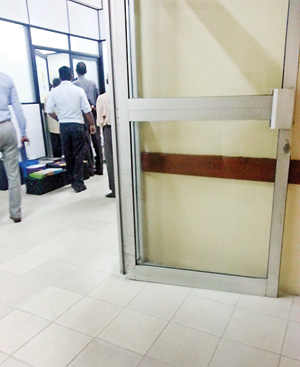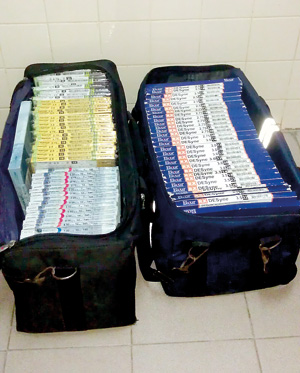News
Macabre trade in medical devices
The waiting area of Cath Lab 1 (catheterisation laboratory) at the National Hospital is crowded with relatives of patients undergoing angiogram tests, their faces clouded with worry. In the middle of the lab, large bags of medical devices lie open with their owners walking in and out as they please.
Every day when angiogram tests are being conducted these salesmen and women come in with their goods, lay them on display in the waiting area and corridor leading to Cath Lab 1 and 2 and wait for “buyers” – the worried family and relatives of cardiac patients.

Salesmen and women in with their goods waiting for buyers.
Chaminda* and his brother stood in the corridor of the lab awaiting the doctor’s verdict. When Chaminda’s father was admitted to Kalubowila Hospital following a second heart attack his family was told that an angiogram test had to be carried out in order to make a proper diagnosis and obtain treatment. He was transferred to the General Hospital’s Cardiac Unit.
When a cardiac patient is diagnosed as needing stents surgery the smartly-dressed sales representatives hovering in the cath lab jump swiftly into action. The doctor treating the patient will inform the patient’s family of the requirement and prescribe the features of the stent. The brand of the product will be prescribed, depending on the doctor; at times the patients can select one from about 10 brands available in the corridor of the cath lab depending on their financial means and the quality of the product they want.
The government does not provide stents, devices used in percutaneous coronary intervention (PCI) treatment used to restore blood flow through narrow or blocked arteries of cardiac patients. ”We were told we have to find about Rs. 250,000 or more for the treatment. They asked us if we can get the money,” Chaminda said. His father retired from the army years ago, and his mother does not work.
“We have to find the money somehow. We had the money collected when we came to the hospital.” Chaminda later found out that he could make a part payment at the time of the procedure and pay the rest at the time the patient is being discharged, which he says is a relief considering the circumstances the patients and families are facing.
According to sources a patient who is rushed to hospital as an emergency case will only be sent to the Cardiac Unit if they are able to raise the funds needed for the procedure.

Medical devices packed into bags and waiting for buyers.
“The doctors will ask, and if the patients cannot find the money the doctors will put them on treatments using drugs, not using stents”, a staff member of the Cardiac Unit in the National Hospital explained speaking on condition of anonymity. This is disputed by the Director of the National Hospital, Dr. Anil Jasinghe, who says the government provides bare metal stents which are an older, cheaper variety. The common, more modern device used, drug-eluting stents, are only available at a price, from the medical representatives stationed outside the labs.
This situation is not unique to the National Hospital, nor is it unique to the Cardiac Unit. Conditions in other teaching hospitals with cardiac, eye and orthopaedic units are the same. Medical representatives selling stents, eye lenses and orthopaedic devices have access to the hospitals and the target market, patients, claimed Dr. Jayantha Bandara of the Senaka Bibile Memorial Association.
He says technicians who sell orthopaedic devices to surgeons working in the unit even have access to the theatres when surgery takes place, to provide technical assistance with fitting the devices. ”The surgeons and other doctors are not trained in the latest equipment. Instead, the doctors have to depend on the company representatives for technical assistance,” he claimed.
The cost of the stent starts from about Rs. 150,000 and can vary depending on the brand, quality and the country of manufacture. Patients who need financial assistance can apply to the President’s Fund, which would give them up to Rs. 150,000. The medical sales reps are well aware of the process and even have connections with the fund office to ensure speedy payments.
Although reps selling or introducing drugs to doctors are only allowed access to government hospitals for two days a week, during specific hours, salespeople with devices are allowed a free hand. Hospital authorities turn a blind eye as there is no alternative.
“They have always been there since the time the procedure was started in the hospital. When the test is done, the stents have to be at hand to be administered immediately. You cannot ask the patient to buy it from outside. The doctor has to decide on the size and other requirement only during the test. They are there only because there is no other alternative available,” Dr. Jasinghe said.
Neither the Ministry of Health, nor the Cosmetics, Drugs and Devices Control Board has ever intervened to control prices or prevent malpractices. When asked, Health Ministry Secretary Dr. D. M. R. B Dissanayake explained that exerting control was difficult due to various forces at play.
“We are trying to regulate it but it is not easy,” Dr. Dissanayake explained. Price control was one of the main features of the much-hyped Medicinal Drug Policy passed in March. The laws and regulations pertaining to this policy have, however, been elusive. No new regulations or authority has been established yet, although promises were made for urgent action at the time of passing the bill.
Dr. Dissanayake said the regulations were still being formulated and would be introduced in September or October.
* Name changed

